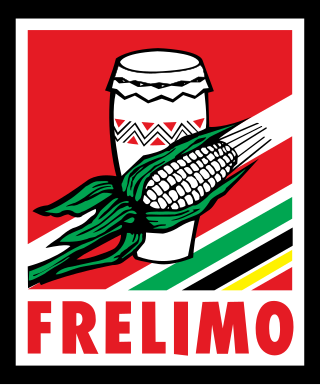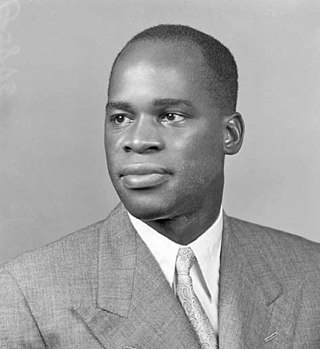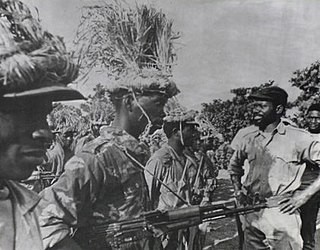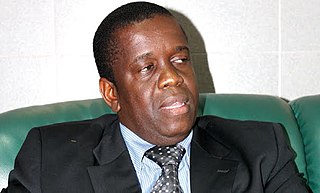
Samora Moisés Machel was a Mozambican politician and revolutionary. A socialist in the tradition of Marxism–Leninism, he served as the first President of Mozambique from the country's independence in 1975.

FRELIMO is a democratic socialist political party in Mozambique. It has governed the country since its independence from Portugal in 1975.

Eduardo Chivambo Mondlane was a Mozambican revolutionary and anthropologist, and founder of the Mozambican Liberation Front (FRELIMO). He served as the FRELIMO's first leader until his assassination in 1969 in Tanzania. An anthropologist by profession, Mondlane also worked as a history and sociology professor at Syracuse University before returning to Mozambique in 1963.

Armando Emílio Guebuza is a Mozambican politician who was the third President of Mozambique from 2005 to 2015.

The Mozambican Civil War was a civil war fought in Mozambique from 1977 to 1992. Like many regional African conflicts during the late twentieth century, the impetus for the Mozambican Civil War included local dynamics exacerbated greatly by the polarizing effects of Cold War politics. The war was fought between Mozambique's ruling Marxist Mozambique Liberation Front (FRELIMO), the anti-communist insurgent forces of the Mozambican National Resistance (RENAMO), and a number of smaller factions such as the PRM, UNAMO, COREMO, UNIPOMO, and FUMO.

Carlos Alberto Lopes Cardoso, known as Carlos Cardoso was a journalist born in Mozambique from Portuguese parents. His murder in 2000 followed his newspaper's investigation into corruption in the privatisation of Mozambique's biggest bank.

The Mozambican War of Independence was an armed conflict between the guerrilla forces of the Mozambique Liberation Front (FRELIMO) and Portugal. The war officially started on 25 September 1964, and ended with a ceasefire on 8 September 1974, resulting in a negotiated independence in 1975.
Articles related to Mozambique include:
Groups interested in freeing Mozambique from Portuguese colonial rule and making it an independent nation emerged in the early 1900s, shortly after Portugal had defeated the last of the native chieftaincies and established effective control over the territory.

Marcelino dos Santos was a Mozambican poet, revolutionary, and politician. As a young man he travelled to Portugal, and France for an education. He was a founding member of the Frente de Libertação de Moçambique, in 1962, and served as the party's deputy president from 1969 to 1977. He was Minister of Economic Development in the late 1970s, Frelimo Political Bureau member in charge of the economy in the early 1980s, Chairman of the country's parliament, the Assembly of the Republic, from 1987 to 1994, and, as of 1999, remained a member of the Frelimo Central Committee. He represented the left wing of the party, remaining an avowed Marxist-Leninist, despite the party's embrace of capitalism in recent decades, an embrace which dos Santos declared was temporary.

The People's Republic of Mozambique was a socialist state that existed in present-day Mozambique from 1975 to 1990. It was established when the country gained independence from Portugal in June 1975 and the Mozambican Liberation Front ("FRELIMO") established a one-party socialist state led by Samora Machel. The state enjoyed close political and military ties with the Soviet Union, which was one of the first nations to provide diplomatic recognition and financial support to the fledgling FRELIMO government. For the duration of its history, the People's Republic of Mozambique remained heavily dependent on Soviet aid, both in financial terms as well as with regards to food security, fuel, and other vital economic necessities. From 1977 to 1992, the country was devastated by a deadly civil war which pitted the armed forces against the anti-communist Mozambique National Resistance (RENAMO) insurgency, backed by neighbouring Rhodesia and South Africa.

Josina Abiathar Muthemba Machel was a leader of FRELIMO and a significant figure in the struggle for independence in Mozambique.
A luta continua was a slogan used by the FRELIMO movement during Mozambique's war for independence from Portuguese colonial rule. The phrase, coined by FRELIMO's first president, Eduardo Chivambo Mondlane, was employed to rally support in the liberated zones of Mozambique. After Mondlane's assassination in 1969, his successor, Samora Machel, continued to use the slogan to mobilize the population in the post-independence era. Machel, who became the first president of an independent Mozambique in 1975, utilized "A luta continua" as an unofficial national motto. The slogan encapsulated Mondlane's vision: "We fight together, and together we rebuild and recreate our country, producing a new reality—a New Mozambique, United and Freed."

Daviz Mbepo Simango was a Mozambican politician who was Mayor of Beira from 2003 to the day of his death in February 2021. He was also the President of the Democratic Movement of Mozambique (MDM). He was son of Uria Timoteo Simango the first Vice-President of FRELIMO and Celina Tapua Simango. He joined the main opposition party RENAMO in 1997 and became Mayor of Beira in 2003 as its candidate. On March 6, 2009, he founded a new party, the Movimento Democrático de Moçambique, or MDM.
Janet Rae Mondlane is an American-born Mozambican activist. Together with her husband, Eduardo Chivambo Mondlane, she founded FRELIMO and helped organize the liberation of Mozambique from Portuguese colonialism.

The Political Bureau of the Central Committee of FRELIMO was a Politburo which briefly assumed the responsibilities of the President of the People's Republic of Mozambique between 19 October 1986 and 6 November 1986 following the death of Samora Machel and the election of Joaquim Chissano to succeed him. The Politburo was reformed in 1989 at the FRELIMO Party 5th Congress.

Tomaz Aquino Messias de Bragança was a Goan physicist, journalist, diplomat and Mozambican social scientist at the Eduardo Mondlane University. He played a leading intellectual and political role in the campaign for the decolonialisation of Mozambique from its colonial power Portugal.
The present honours and decorations were passed by the Mozambican Assembly of the Republic in March 2011. It consists of two honorary titles, five Orders and some medals. The awards are managed by the National Commission on Honours and Decorations. The President of Mozambique will present the awards after recommendation by the Assembly, the provincial and central governments, the armed forces and the educational establishment.
Paulo José Gumane was a Mozambican union activist, politician and guerrilla leader active during the Mozambican War of Independence. A founder member of the independence movement FRELIMO, he later broke with it and was involved with a number of opposition organisations, notably the Zambia-based COREMO.
The League of Mozambican Women, also known by its acronym LIFEMO, was an organization associated with FRELIMO, founded in 1962. Its aim was to support the families of combatants during the war of independence and to spread the principles of the Front. Selina Simango held the presidency and Priscila Gumane the vice-presidency. In addition to participating in the Pan-African Women's Congress, these leaders travelled frequently, establishing a network of support with countries or organizations that collaborated with the struggles for independence in Africa.













